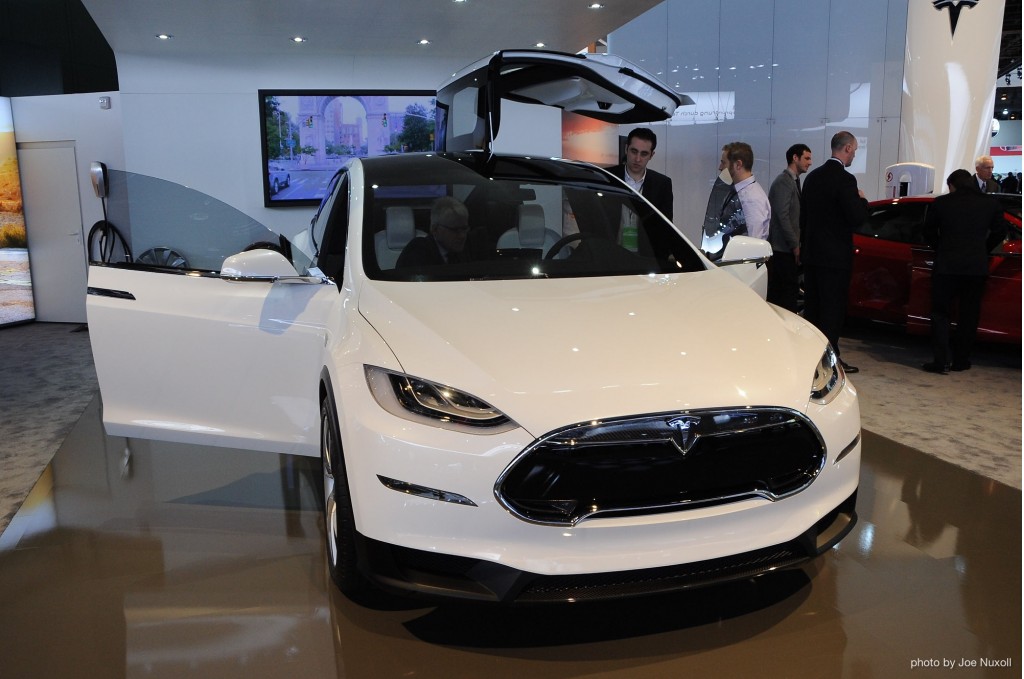The rear-view mirror has now been with us exactly 100 years, having first been introduced in 1914, and it hasn't changed much in all that time.
It's a small area of mirrored glass--three of them now, actually--for the purpose of seeing through the rear window or along each side of the car without the driver having to turn his or her head more than slightly.
For decades, concept cars have shown one or more of these mirrors replaced by video cameras that show real-time images on a small display screen the same size as the mirror.
Tesla taking lead
Now Tesla Motors [NSDQ:TSLA] appears to be one of the companies taking the lead in getting government regulators to update Federal vehicle standards to permit such a replacement on production vehicles sold to the public.
The goal for the electric car-maker is to eliminate a large source of aerodynamic drag from its future cars.
The mandated mirrors on the driver's and front passenger's doors increase the car's frontal area. Aerodynamics engineers spend a great deal of time in the wind tunnel to make air flow over door mirrors as smoothly as possible, to reduce the energy needed to overcome that resistance.
Concept drawings and some prototype versions of Tesla's 2015 Model X electric crossover utility vehicle do not have door mirrors, but use a tiny camera in their place with the images displayed inside the passenger compartment.

Tesla Model S Designer Franz von Holzhausen
3 to 6 percent of total drag
On Friday, journalist Allison von Diggelen wrote that Tesla design chief Franz von Holzhausen told her the company is talking with "authorities" about getting the necessary permissions to replace door mirrors with cameras and electronic displays.
Tesla is presumably in discussion with the National Highway Traffic Safety Administration (NHTSA), which issues the Federal Motor Vehicle Safety Standards (FMVSS) document, first issued in 1967 and regularly updated since then.
While door mirrors may not seem like much of a big deal, both of them together--with a total area of up to 2 square feet between them--create 3 to 6 percent of a typical vehicle's total aerodynamic drag.
Eliminating them could reduce energy consumption as much as lowering the car's roof by almost half an inch.
The Volkswagen XL1 ultra-high-mileage two-seater uses video-camera technology instead of door mirrors, as von Diggelen notes--but it is not designed to comply with all parts of the FMVSS because it's not intended to be sold in the United States.
Cumbersome volume of rules
Von Holzhausen "bemoaned the cumbersome amount of regulations that prevent or delay innovative car design," the author writes, linking to an earlier interview she did with Tesla CEO Elon Musk in January.

Tesla Model X at 2013 Detroit Auto Show
In that interview and a related video, Musk complained about the regulations and their specificity, including some points that cover headlamp design and elements of the dashboard user interface that he views as "completely anachronistic."
The discussion with von Holzhausen was published on Friday in Boldly Going, a portion of her "Fresh Dialogues" blog that covers her family's trip in their Tesla Model S from Silicon Valley to Los Angeles using the company's Supercharger network of quick-charging stations.
Hand mirrors for women drivers
Automotive historians note that the earliest known reference to a rear-view mirror being used in a car comes from 1906, when author Dorothy Levitt wrote in her book, The Woman and the Car, that women were advised to "carry a little hand-mirror in a convenient place when driving"
Doing so, Levitt suggested, permitted women drivers to "hold the mirror aloft from time to time in order to see behind while driving in traffic."
It would take eight more years for the first fixed mirror to show up on a production car. Vibration-free mounts and auto-dimming aside, not a great deal has changed in rear-view mirrors since then.
_______________________________________________













